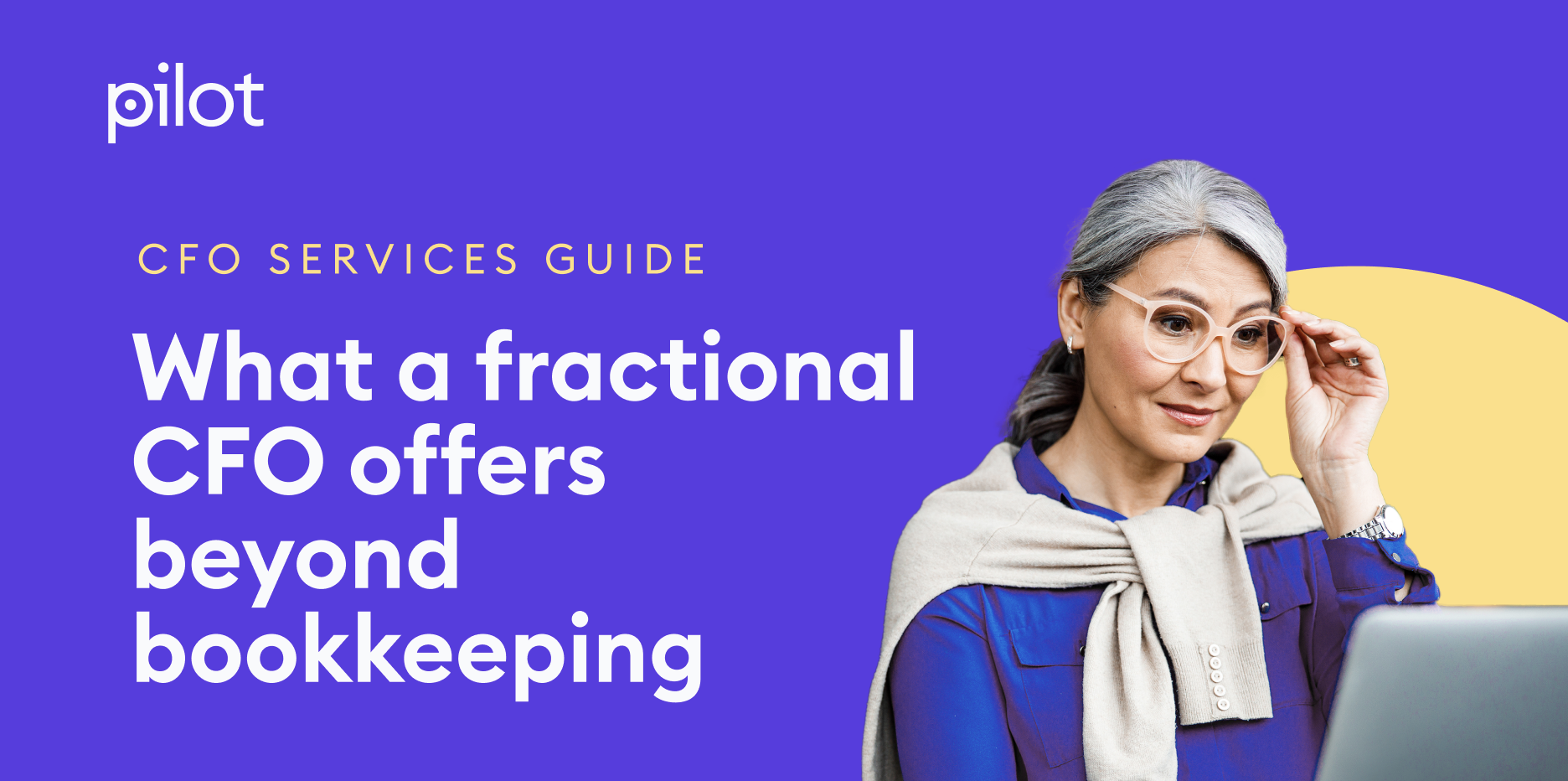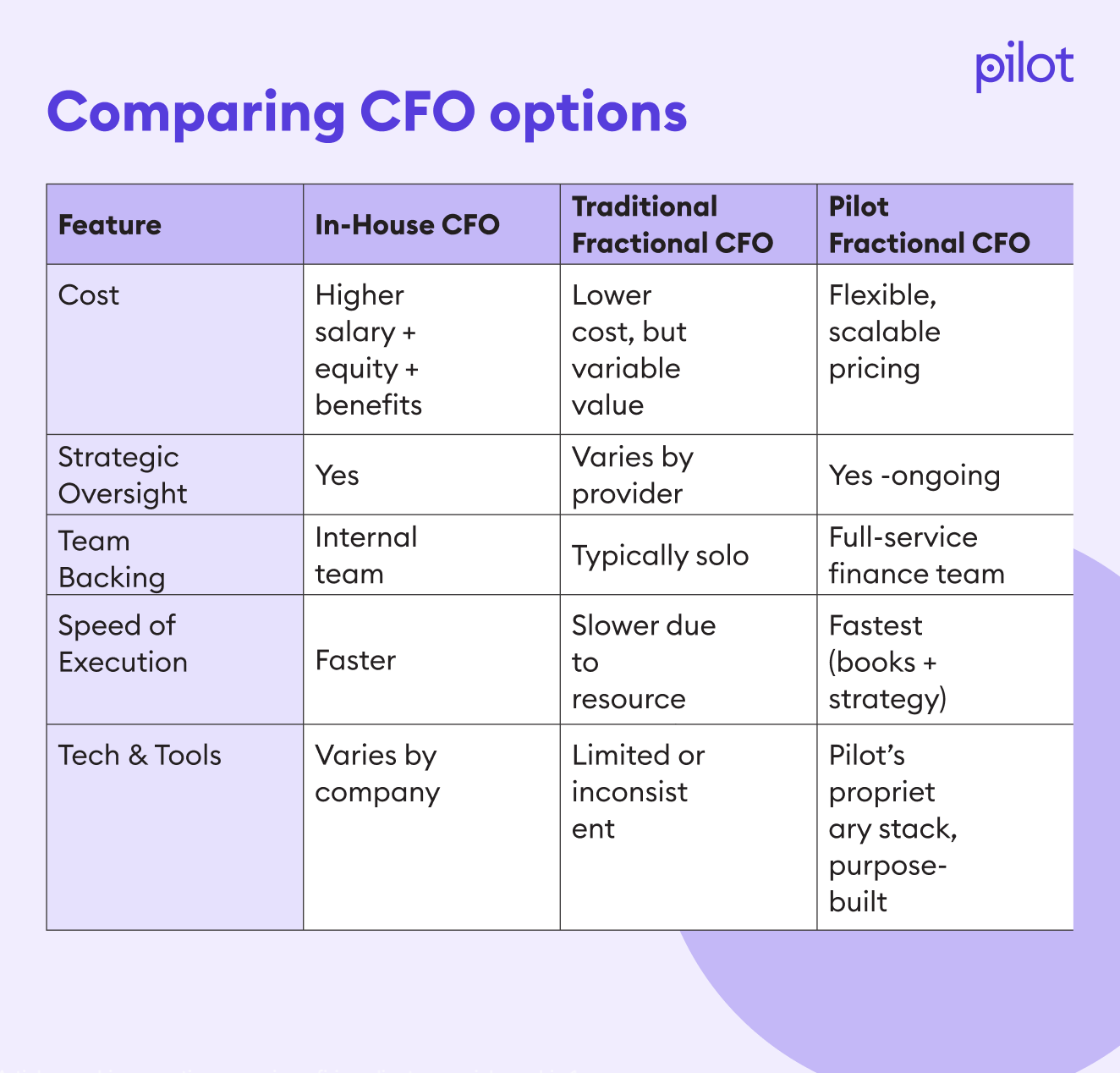Why hire a fractional CFO? Here’s when it makes sense

Here’s the truth—you probably don’t need a full-time finance hire for your startup or growing business. But you do need to have a handle on the finances. That’s where a fractional CFO can help.
A founder we’ve worked with for over 3 years told us recently, “Early on, having a fractional CFO can feel like using a sledgehammer to crack a nut. But…”
In this article, we’ll walk through when we see teams bring in a fractional CFO. So if you’re asking yourself: “What is a fractional CFO? Why should I hire a fractional CFO? What will that person actually do? Is this worth the added cost?” Keep reading.
Success story: How one founder's CFO saves him 15 hours per week →
First, what is a fractional CFO (and what do they do)?
A fractional CFO provides part-time strategic financial leadership, giving you expert guidance without a full-time salary.
This individual partners with startups and growing businesses to clean up the finances, implement best practices, advise on strategic decisions, and help set them up for success.
As one of the founders, we work with recently said, “With my fractional CFO, I never need to worry about my finances. And anyone who steps into our company, whether it’s an investor or a partner, is never going to question the financial work we’ve done. Not many startups can say that.”
Common areas of focus for a fractional CFO include:
- Financial forecasting and budgeting
- Budget vs actuals analysis and tracking
- Scenario modeling for different growth paths
- Investor reporting and board updates
- KPI and performance tracking (see the e-commerce KPIs you should monitor)
- Hiring and compensation planning
- Fundraising and due diligence support
Most founders are making the decision between hiring fractional CFO support, or continuing to handle the finances themselves. Many founders tell us that they primarily go “off of gut feel.”
Which works for a while! It’s true that you can continue to stay scrappy and maintain your own finances. The problem we see most often is when founders spend too much time DIYing the finance function, the business starts getting more complex, or the finances start to undergo greater scrutiny (like during investor due diligence). We support founders being cost conscious (we’re CFOs, after all), but we’ve found that managing the finances is not an area for a cheap solution.
After working with over 400 companies, we step in as experienced fractional CFOs to give you clear financial insights, model out different scenarios, and ensure you have the right financial foundation for growth.And remember, a bookkeeper or accountant is focused on the historical finances, whereas your fractional CFO is your dedicated partner to forecast your future financial health.
When to hire a fractional CFO
You’re preparing to raise capital
From Pre-Seed through Series C or a strategic exit, a fractional CFO helps you build credible financial models, prepare pitch decks, and evaluate term sheets. A fractional CFO can help ensure you’re speaking the same language as investors and, more importantly, their involvement can add trust when you’re speaking with investors. Building trust is the most important element of a successful fundraise, and your finances help create that trust for investors. Ensuring that your numbers are accurate, your projections are sound, and your materials are polished can make the difference between closing the round or not.
You need better cash flow visibility
If you’re unsure how to track cash inflows and outflows or how many months of runway you have, you need more than historical financial statements from a bookkeeper. A fractional CFO can create customized reports with projected financials with proactive insights into where your cash is going and how to extend or optimize it.
For example: We helped one client free up $200k of liquidity through tactical vendor and payment terms negotiations.
You’re scaling operations or headcount
You may be ready to make multiple hires or launching a new product line or expanding into a new market.These exciting but demanding steps require planning and discipline. A CFO builds budgets that align with your growth strategy and ensures financial decisions align with your company goals (operational, cultural, etc). This can mean modeling out those three new sales reps that you want to hire, building compensation plans, and understanding how these hires will impact revenue growth.
Your reporting isn’t keeping up
Outdated reports, inconsistent dashboards, make-shift budget spreadsheets, and last-minute board prep are signs your reporting infrastructure can’t scale. Fractional CFOs turn raw financial data into clear and actionable insights for internal and external stakeholders.
Why founders choose fractional over full-time CFOs
Hiring a full-time CFO can be costly and unnecessary at early stages. Fractional support offers flexibility, strategic value, and, frankly, lower long-term financial commitment. The following table breaks down the pros, cons, and considerations of the different levels of hiring a full-time financial executive, including bringing on Pilot as a partner.

If you need financial support but are not ready for a full-time CFO, we’re here to help. Explore Pilot’s Fractional CFO Services
Helpful resources from fractional CFOs
Founders don’t need more fluff, they need clear tools that support real decisions. These guides, built by our CFO team, break down complex finance topics in plain terms:
- Annual Planning Playbook: Set goals, align your team, and build a financial plan you can actually use.
- Cash Flow Guide: Understand how money moves through your business and how to manage it confidently.
Every one of these is built to help you think and act like a CFO, even before you have one full-time.
You’re not too early for CFO support
Don’t wait for the chaos or errors to pile up before bringing in financial support. A good fractional CFO can assimilate into where you are immediately. From building a pitch deck, modeling headcount growth, or fixing broken reporting, the sooner you get strategic support, the faster and wiser you’ll grow.
Let’s talk about your goals and what you need from a CFO partner. Speak to an Expert
What to expect when working with a fractional CFO at Pilot
When you work with a Pilot fractional CFO, you're getting more than just a contractor or consultant. You're getting a senior finance partner who integrates directly into your business. From day one, they bring structure, clarity, and strategic support that grows with you.
Here’s what you can expect:
- Proven fundraising experience: $9B+ raised across 400+ startups; our CFOs know what investors want to see
- Senior-level expertise: Ex-VCs, bankers, and operators who’ve sat on both sides of the table
- Embedded partnership: Structured monthly reviews, clean data, and real-time KPIs—not just static reports
- Execution support: We don’t just build models—we help you act on them
- Tailored to your stage: Whether you’re raising, restructuring, or expanding, we help you plan and move forward
- Built-in tech stack: Smart tools and systems that make financial operations easier, not harder
You don’t have to build a back office from scratch. You just need a partner who can meet you where your business is. We know fractional support is a step, not the finish line. Our goal is to set you up with the clarity, systems, and strategy you’ll need when it’s time to hire a full-time CFO. You’re not there yet, and that’s ok. A fractional CFO can help get you there.
Common FAQs about Fractional CFOs
Q: When should I hire a fractional CFO?
A: A good time to bring in a fractional CFO is when you're fundraising, scaling operations, need better visibility into cash flow, or your reporting isn’t keeping up. If you’re guessing more than planning, it might be time.
Q: What does a fractional CFO typically cost?
A: Most fractional CFOs charge between $3,000 and $8,000 per month, depending on business size, complexity, and scope of services.
Q: What types of businesses benefit most from fractional CFOs?
A: Startups and growing businesses benefit most, especially those needing financial leadership but not ready for a full-time CFO.
Q: What’s the difference between a full-time and fractional CFO?
A: A fractional CFO provides part-time strategic financial leadership, giving you expert guidance without a full-time salary.
Q: How is Pilot’s fractional CFO service different from hiring a freelance CFO?
A: Pilot CFOs work on top of accurate books and are backed by a full-service finance team. You get strategic insight, fast execution, and tools built to scale, not just spreadsheets.





